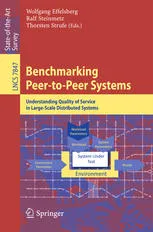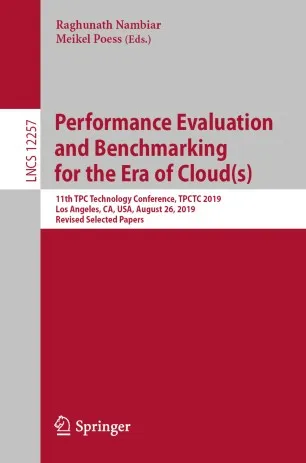Benchmarking Peer-to-Peer Systems: Understanding Quality of Service in Large-Scale Distributed Systems
4.0
بر اساس نظر کاربران

شما میتونید سوالاتتون در باره کتاب رو از هوش مصنوعیش بعد از ورود بپرسید
هر دانلود یا پرسش از هوش مصنوعی 2 امتیاز لازم دارد، برای بدست آوردن امتیاز رایگان، به صفحه ی راهنمای امتیازات سر بزنید و یک سری کار ارزشمند انجام بدینکتاب های مرتبط:
معرفی کتاب: Benchmarking Peer-to-Peer Systems: Understanding Quality of Service in Large-Scale Distributed Systems
کتاب Benchmarking Peer-to-Peer Systems با تمرکز بر تحلیل سیستمهای Peer-to-Peer یا به اختصار P2P، به بررسی مفاهیم و چالشهای مرتبط با کیفیت خدمات (Quality of Service یا QoS) در این نوع سیستمها میپردازد. این کتاب، راهنمای جامعی برای پژوهشگران، مهندسان نرمافزار و علاقهمندان به سیستمهای توزیعشده است که درک عمیقی از مفاهیم پیشرفته در این حوزه ارائه میدهد.
خلاصهای از کتاب
سیستمهای Peer-to-Peer اساس بسیاری از فناوریهای مدرن مانند اشتراکگذاری فایل، توزیع محتوا، و حتی بلاکچین را تشکیل میدهند. با پیچیدهتر شدن این سیستمها و افزایش کاربران، چالشهای جدیدی در اندازهگیری و تأمین کیفیت خدمات در مقیاس بزرگ نمایان میشوند. این کتاب به دنبال پاسخ به سوالات مهمی مانند این است که چگونه میتوان عملکرد این سیستمها را اندازهگیری کرد و کدام استراتژیها برای بهینهسازی QoS مناسبتر هستند.
نویسندگان، با استفاده از مثالیهای عملی و چارچوبهای نظری، به بررسی روشهای ارزیابی سیستمهای P2P پرداخته و ابزارهایی برای مدلسازی و شبیهسازی این سیستمها ارائه میدهند. محوریت اصلی این کتاب ارائه بینشی عمیق به مهندسان و محققان برای بهبود عملکرد و کارایی این سیستمها است.
آنچه از این کتاب خواهید آموخت
- مبانی سیستمهای Peer-to-Peer و نقش آنها در دنیای امروز
- چالشهای تضمین کیفیت خدمات (QoS) در سیستمهای توزیعشده
- متدولوژیهای مختلف برای Benchmarking و ارزیابی سیستمهای P2P
- نحوه مدلسازی و شبیهسازی رفتار شبکه در مقیاس بزرگ
- استراتژیهای پیشرفته برای بهینهسازی عملکرد
نقلقولهای معروف از کتاب
"Quality of Service is not an isolated property; it reflects the entire system's design and its interaction with end-users."
"Through diligent benchmarking, we can pave the way for a more resilient and efficient distributed architecture."
چرا این کتاب مهم است؟
این کتاب به عنوان منبعی ارزشمند برای درک کیفیت خدمات در سیستمهای Peer-to-Peer عمل میکند. با پیشرفت فناوری و گسترش استفاده از سیستمهای P2P در انواع برنامههای کاربردی، شناخت چالشها و فرصتهای ارائه شده توسط این سیستمها ضروری است. نویسندگان با ترکیب بینشهای نظری و کاربردهای عملی، رویکردی جامع ارائه میدهند که نه تنها برای محققان دانشگاهی بلکه برای مهندسان فعال در صنعت نیز کاربردی است.
اهمیت این کتاب در تأکید آن بر Benchmarking و معیارهای استاندارد برای بهبود کارایی سیستمهای توزیعشده است، که به طور مستقیم تأثیر بسزایی بر توسعه و استقرار فناوریهای آینده خواهد داشت.
Introduction
"Benchmarking Peer-to-Peer Systems: Understanding Quality of Service in Large-Scale Distributed Systems" is an insightful and comprehensive guide to understanding the challenges, methodologies, and techniques for evaluating Peer-to-Peer (P2P) systems. As these systems continue to grow in significance due to their scalability, resilience, and decentralized nature, their performance and reliability have become critical themes in the world of distributed computing. This book provides both a foundation and an advanced exploration of the key concepts, offering valuable knowledge for researchers, professionals, and students alike.
Written by leading experts Wolfgang Effelsberg, Ralf Steinmetz, and Max Lehn, and edited together with Thorsten Strufe, the book dives deeply into the Quality of Service (QoS) parameters critical to P2P systems. It explains how benchmarking such systems requires a unique methodological approach given their decentralized and large-scale nature. Through systematic chapters, the authors unpack frameworks, metrics, test environments, and evaluation processes required to fully understand the QoS characteristics of P2P architectures.
Summary of the Book
At its core, the book offers a multidimensional perspective on benchmarking P2P systems. The authors begin with an introduction to P2P technology itself, detailing its architecture, applications, and inherent challenges. The focus quickly shifts to benchmarking principles, where the need for meaningful evaluation criteria is established. The book defines critical QoS metrics such as availability, latency, throughput, fault tolerance, scalability, and fairness.
Following the definition of QoS parameters, the authors delve into testbed design to simulate P2P environments. They discuss both real-world and emulated environments, comparing their advantages and trade-offs. Readers will find a structured approach to creating benchmark suites tailored to specific P2P applications, whether for file sharing, content delivery, or distributed computations.
A significant portion of the book is devoted to practical use cases where benchmarking methodologies are applied. These examples illustrate the effects of design choices, environmental variations, and usage scenarios on system performance. The book concludes with insights into current trends and future challenges for P2P systems, cloaking technical advice in broader recommendations for developers and researchers.
Key Takeaways
- A thorough understanding of the foundational principles of P2P architectures.
- Comprehensive definitions of QoS parameters critical to evaluating distributed systems.
- Practical guidance on creating benchmarking environments and test suites.
- In-depth case studies illustrating real-world applications and performance challenges.
- Insights into the future trends of P2P technology and its potential impact on distributed computing.
Famous Quotes from the Book
"In distributed systems, achieving high performance is not merely a question of scale, but of fine-tuned coordination and fairness across all nodes."
"Benchmarking a peer-to-peer system is not about rigorously finding flaws; it’s about methodically unlocking its potential."
Why This Book Matters
Peer-to-Peer systems are already key drivers in areas such as content distribution, decentralized finance, and collaborative computing. As these technologies expand and intertwine with emerging paradigms like blockchain and Web3, understanding how to evaluate their performance becomes an even more vital aspect of their adoption. This book bridges the gap between high-level theory and practical implementation, equipping readers with the knowledge to enhance and refine P2P technologies for the future.
By focusing on QoS, the authors emphasize the aspects of distributed systems that users care about the most, including uptime, speed, and reliability. The book’s robust methodology can also inspire novel designs for new P2P applications, pushing the boundaries of what decentralized systems can achieve. Whether you are a seasoned engineer, a student delving into distributed systems for the first time, or an industry leader evaluating P2P solutions, this book offers indispensable guidance and cutting-edge insights.
دانلود رایگان مستقیم
شما میتونید سوالاتتون در باره کتاب رو از هوش مصنوعیش بعد از ورود بپرسید
دسترسی به کتابها از طریق پلتفرمهای قانونی و کتابخانههای عمومی نه تنها از حقوق نویسندگان و ناشران حمایت میکند، بلکه به پایداری فرهنگ کتابخوانی نیز کمک میرساند. پیش از دانلود، لحظهای به بررسی این گزینهها فکر کنید.
این کتاب رو در پلتفرم های دیگه ببینید
WorldCat به شما کمک میکنه تا کتاب ها رو در کتابخانه های سراسر دنیا پیدا کنید
امتیازها، نظرات تخصصی و صحبت ها درباره کتاب را در Goodreads ببینید
کتابهای کمیاب یا دست دوم را در AbeBooks پیدا کنید و بخرید
1373
بازدید4.0
امتیاز0
نظر98%
رضایتنظرات:
4.0
بر اساس 0 نظر کاربران
Questions & Answers
Ask questions about this book or help others by answering
No questions yet. Be the first to ask!














